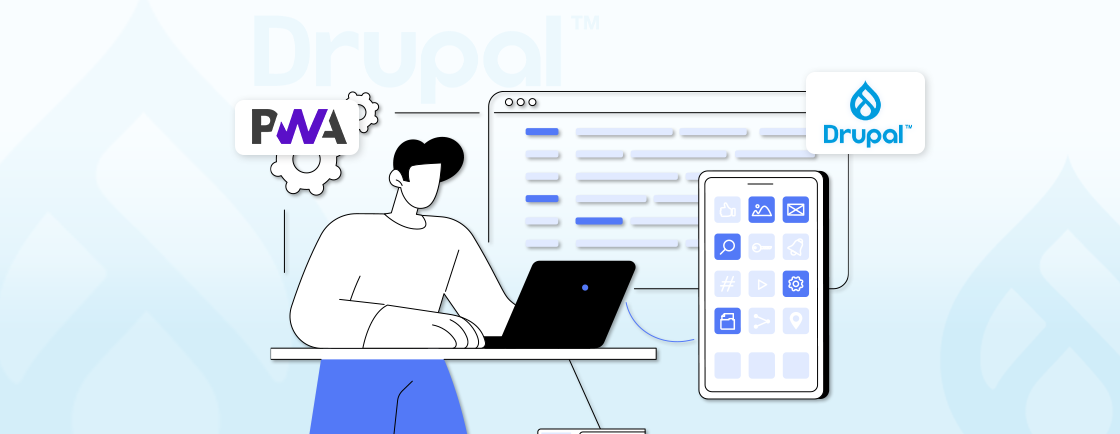Table of Contents
Nowadays, building a strong online presence is crucial for success, and a great practice to follow is Search Engine optimization (SEO). It ensures your website ranks high in search results, making it easily discoverable by your target audience and, ultimately, increases reach of the site.
For Drupal users, implementing SEO strategies can feel like navigating unfamiliar territory. But don’t worry; Drupal’s inherent flexibility, powerful modules and best practices will let you quickly optimize the website for search engines.
So, let’s see how SEO in Drupal is implemented. In this blog, we’ll tell you how Drupal SEO will take your website to the next level in terms of traffic and engagement. But first, let’s look at the importance of Drupal SEO.
Importance of SEO in Drupal Websites
Nowadays, a well-designed website is no longer enough. To truly thrive online, your site must be visible on the top of the Search Engine Results Pages (SERPs) for relevant queries. This is where SEO becomes crucial for your Drupal website. Effective SEO strategies act like a bridge, connecting your website with the exact audience searching for your content or services.
When the competition for online attention is high, having a website built on a powerful CMS like Drupal is only half the success. To stand out, you need your website to be easily visible for the people searching for what you offer. That’s where SEO comes into the picture, completing the roadmap to success.
Benefits of Implementing SEO in Drupal Website
- Organic Traffic Powerhouse: SEO is the key for making your site visible to those who are actively searching for your products, services, or information. Unlike paid advertising, this organic traffic is more sustainable and cost-effective in the long run.
- Improved Brand Awareness: When your Drupal website ranks higher on SERPs, it gains greater visibility. This increased exposure results in more people recognizing your brand, establishing you as a thought leader in your industry.
- Targeted Audience Engagement: SEO allows you to target specific keywords relevant to your niche. This means you can create a target audience by researching out keywords that reflect content or services you provide.
- Enhance User Experience (UX): Many SEO best practices, like clear website structure and fast loading times can enhance user experience. This keeps visitors engaged and coming back for more, fostering brand retention. SEO isn’t just about ranking high; it’s also about creating a website users love navigating and interacting with.
- Measurable Growth: SEO allows you to track your website’s performance through analytics tools. You can see what’s working and what’s not, enabling data-driven decisions to optimize your website.
Leveraging SEO services can transform your website into a powerful lead-generation machine. It attracts the right audience, builds brand awareness, and ultimately helps you achieve your website’s goals. So, unlock the true potential of your Drupal website and embrace the benefits of SEO.
Consequences of Poor Drupal SEO
While Drupal empowers you to build intricate websites, neglecting SEO can leave your online presence in the depths of search engine results. Here’s a glimpse into the potential consequences of overlooking SEO in your Drupal website:
- Low Search Engine Rankings: Poor SEO practices, such as keyword stuffing, duplicate content, or lack of relevant content, can lower search engine rankings. This means your highly valuable Drupal site may not appear on the first page of search results, reducing organic traffic.
- Decreased Organic Traffic: Lower search engine rankings lead to decreased organic traffic. If your Drupal site doesn’t rank well for relevant keywords, it’s less likely to have visitors from search engines, limiting your potential audience.
- Negative User Experience: Poor SEO can also lead to a negative user experience. For example, if your Drupal site has irrelevant content, users may leave your site before it fully loads, increasing bounce rates.
- Reduced Conversions: Poor user experience and content can result in reduced conversions. Whether your goal is to generate leads, sell products, or drive engagement, poor SEO can hinder these efforts and impact your bottom line.
- Damage to Brand Reputation: A poorly optimized Drupal site may negatively affect your brand. Users may perceive your site as untrustworthy or unprofessional if it doesn’t rank well or provide a good user experience, potentially damaging your brand reputation.
- Difficulty in Competing: Effective SEO is crucial for standing out from competitors. Poor SEO practices can make it challenging to compete effectively, as competitors with better SEO may get more traffic and customers.
- Wasted Potential and ROI: A Drupal website with poor SEO fails to capitalize on its full potential. The time and resources invested in creating compelling content or offering valuable products are wasted if they are difficult to find.
- Long-Term Impact: The consequences of poor SEO can be long-lasting. Even if you improve your SEO tactics later, recovering lost rankings and traffic may take time. Prioritizing good SEO practices from the beginning is essential to avoid these long-term effects.
Overall, poor SEO on Drupal websites can have many negative consequences, impacting visibility, traffic, and your online success. Implementing and following best SEO practices is essential to maintain a competitive edge in the digital landscape.
So, let’s equip you with SEO strategies you can implement for your Drupal website.
How to Implement Drupal SEO?
Implementing SEO for a Drupal website involves a combination of technical optimizations, as well as on-page and off-page strategies. Let’s delve into the three widely used strategies for bringing your Drupal website to the top of SERPs.
Choose the Right Drupal Module
Choosing the right modules can empower your SEO efforts. Let’s discuss popular modules and how they can streamline your optimization process.
- SEO Checklist: Provides a step-by-step guide for on-page SEO best practices
- Function: This module acts as your SEO guide, offering a checklist to ensure your site adheres to best practices. It checks for crucial elements like meta tags, content length, image alt text, and mobile-friendliness.
- Benefit: Provides a structured approach to SEO, highlighting areas needing improvement.
- Metatag: Manage SEO meta tags for your pages and content, including titles, descriptions, and keywords.
- Function: Metatags are snippets of information that describe your webpage content to search engines. The Metatag module allows you to define and manage meta descriptions, titles, and other relevant SEO meta tags for individual pages and content types.
- Benefit: Improves click-through rates by crafting compelling meta descriptions and titles.
- Pathauto: Generate user-friendly and SEO-optimized URLs for your content.
- Function: Creating user-friendly URLs is essential for SEO. Pathauto automates URL generation based on predefined patterns. You can set up patterns that incorporate titles, content types, or custom fields.
- Benefit: Generates clean and informative URLs that are both SEO-friendly and easy for users to understand.
- Redirect: Manages 301 redirects for old or broken URLs to improve user experience and SEO.
- Function: Broken links and outdated URLs can harm your SEO. The Redirect module allows you to manage 301 redirects, seamlessly forwarding users from old URLs to their updated counterparts. This maintains a positive user experience and prevents search engines from penalizing your site for broken links.
- Benefit: 301 redirects act as a bridge between non-existent URLs and their replacements, preventing 404 errors creating a better experience for both users and search engines.
- XML Sitemap: Create and submit an XML sitemap to search engines, ensuring they can easily index your website.
- Function: Search engines use sitemaps to discover and index your website’s content. This module automatically generates and maintains an XML sitemap, ensuring search engines can efficiently find your pages.
- Benefit: Improves search engine crawling and indexing of your website.
These modules can help you reach out to a greater audience. You can also use custom modules for a personalized experience.
Optimize Content for Keywords
Creating valuable content that resonates with your target audience optimizes your website. In this step, we’ll research keywords and optimize content that effectively impacts user search intent.
- Keyword Research: Identify relevant keywords with good search volume and low competition. Use these keywords throughout your content organically, but avoid keyword stuffing.
- Optimize Content: Create high-quality, informative content that caters to your target audience’s needs and search intent.
It will optimize keywords and content for your website, upscaling the rank resulting in more traffic and revenue.
Utilize Meta Tags
Meta tags act as signposts for search engines, providing them with crucial information about your content.
- Meta Titles: Craft compelling and informative title tags (less than 60 characters) that accurately reflect your content and include relevant keywords. These appear in SERPs and influence click-through rates (CTRs).
- Meta Descriptions: Write clear and concise meta descriptions (around 160 characters) summarizing your content and entice users to click on your website in SERPs. Include relevant keywords here as well.
Adding meta tags can help search engines get a clear overview of the content that can directly reflect better ranking.
Create SEO-Friendly URLs
Clean and descriptive URLs not only enhance user experience but also play a role in search engine ranking. We’ll discuss how to ensure your Drupal website has SEO-friendly URLs.
- Clean URLs: Ensure your Drupal website uses clear and concise URLs incorporating relevant keywords. Consider using the Pathauto module to generate SEO-friendly URLs automatically.
- Contextual Linking: Use contextual linking to link to relevant internal pages within your content. This improves navigation and helps distribute links throughout your website, boosting the SEO value of all your pages.
It will add more relevance to your content and increase organic traffic by clicking links that point towards other blogs or pages of the same domain.
Optimize Images
Images can significantly enhance your content, but they can also slow down your website. So, image optimization is essential to ensure fast loading speeds and improved SEO.
- File Names: Use descriptive filenames that include relevant keywords for your images.
- Alt Tags: Add informative alt tags that describe the content of your images. This improves accessibility and helps search engines understand your images.
Optimizing images is crucial because if they are not, it can hinder your website from the rest of the sites, lowering the ranking.
Utilize Social Media Integration
The power of social media goes beyond engagement. We’ll explore how social media integration can amplify your content’s reach and improve your SEO strategy.
- Social Media Marketing: Promote your content and engage with your audience on social media platforms. Increased brand awareness can lead to website traffic and potential backlinks.
- Online Reputation Management: Encourage positive customer reviews and testimonials on platforms like Google My Business and industry-specific review sites.
- Online Communities: Participate in relevant online forums, communities, and discussions by providing valuable insights and sharing your content where appropriate.
- Influencer Marketing: Partner with relevant influencers in your niche to promote your content and reach a wider audience.
With this integration, managing your website comes in handy. But, it’s ideal to opt for digital marketing services to skyrocket your website audience reach.
Monitor and Analyze SEO Performance
This step includes utilizing valuable tools like Google Search Console and Google Analytics to monitor and analyze performance and identify areas for improvement.
- Google PageSpeed Insights: fast-loading Drupal website create better experience for both visitors and search engines. By combining Drupal capabilities with Google PageSpeed Insights, you can ensure your website delivers a speedy and delightful experience for everyone.
- Mobile-friendliness with Lighthouse: Drupal’s responsive design using Lighthouse for mobile audits, can ensure your website delivers an exceptional user experience on all devices, including mobile visitors.
- Google Search Console: Utilize Search Console to monitor your website’s SEO performance, identify crawl errors, track keyword rankings, and submit your sitemap.
- Google Analytics: Integrate Google Analytics with Drupal to track website traffic sources, and user behavior to identify areas for improvement in your SEO strategy.
You can follow the above optimizing tactics or read performance optimization guides for better solutions and best practices.
Implementing these strategies can significantly improve your website’s organic traffic and search ranking. However, SEO is an ongoing process, so stay updated on the latest SEO trends and the best practices followed by professional SEO specialists.
Best Practices for Drupal SEO Implementation
Just implementing SEO is not the optimal choice; if the best practices aren’t followed, it could lead to a blackout of your site. So, let’s check on how internal linking, external linking, fresh content, and additional factors help you stand out in the market.
- Internal Linking: Create a solid internal linking structure by linking relevant pages within your website. This helps search engines understand the relationships between your content and distribute link equity.
- External Backlinks: Building high-quality backlinks from reputable websites plays a significant role in SEO. Create informative, engaging, and shareable content that naturally attracts backlinks organically and use tools to track them to identify opportunities for improvement.
- Structure & Clarity: Use clear and concise language with proper grammar and spelling. Structure your website with a logical hierarchy using descriptive headings (H1, H2, H3) to improve readability for both users and search engines.
- Prioritize User Experience: Always focus on creating a positive user experience on your website. This includes fast loading speeds, clear navigation, and high-quality content.
- Fresh Content: Regularly update your website with valuable content to keep users engaged and improve search engine ranking.
To maintain a robust search engine presence and drive more clicks, follow these best practices and hire Drupal developer for expert support.
Conclusion
Drupal empowers you to control your website’s on-page and off-page SEO. By using its built-in SEO features and extensive contributed modules, you can optimize your content structure, meta tags, internal linking, and image alt text.
Drupal integrates seamlessly with various SEO analyses, empowering you to measure your SEO performance. Additionally, marketing automation tools help you refine your strategy over time, and following best practices help you achieve sustainable organic growth.
FAQs About Drupal SEO
Why might my Drupal website not be ranking well in search results?
Several factors can contribute to poor SEO performance. Some of these include:
– Lack of relevant keyword targeting
– Poor content quality
– Unoptimized on-page elements (titles, meta descriptions, images)
– Weak internal linking structure
– Slow website loading speed
– Lack of backlinks from reputable websites
How do I use Drupal’s built-in features to improve my website’s SEO?
Using modules like Pathauto for user-friendly URLs and Metatag for managing SEO meta tags. Drupal’s core features, like clean URLs and customizable content types, also contribute to a strong SEO foundation.
Can I improve the SEO of an existing Drupal website?
Absolutely! While an ongoing SEO strategy is ideal, by following best practices like keyword research, content optimization, and internal linking, you can gradually enhance your existing website’s visibility.
Unleash the Potential of Drupal
Access expert guides and insights to leverage Drupal for scalable and secure web solutions.





